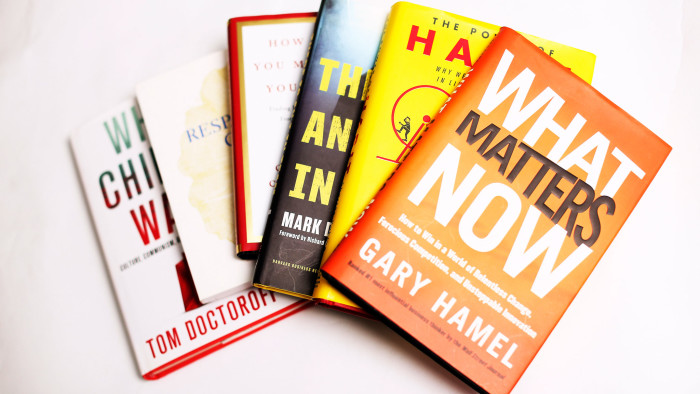Books: The top of the pile

Simply sign up to the Business education myFT Digest -- delivered directly to your inbox.
What Matters Now: How to Win in a World of Relentless Change, Ferocious Competition, and Unstoppable Innovation, by Gary Hamel, Jossey-Bass, RRP$26.95/£17.99
Gary Hamel’s moment may have come. What Matters Now – with the emphasis clearly on the “now” – is not the first book in which he advocates the dismantling of management hierarchies, the importance of diverse teams with strong values, and the need for chief executives to listen to younger staff. But his arguments now have additional fuel, particularly in the form of social media that a generation is using to promote openness, corporate reform and sharing of best practice. Change, Hamel argues, is also essential if established companies are going to emerge successfully from the crisis in developed economies.
…
The Power of Habit: Why We Do What We Do in Life and Business, by Charles Duhigg, Random House/William Heinemann, RRP$28/£12.99
Plenty of business books that try to tap into the scientific world manage to distil complicated research into readable prose. But few take the next step and become essential manuals for business and living. The Power of Habit is an exception. Charles Duhigg not only explains how habits are formed but how to kick bad ones and hang onto the good. He sprinkles this with an enticing mixture of case studies – the man with total memory loss who unerringly finds his way to the kitchen to eat, the chief executive (Paul O’Neill of Alcoa) who turned his company round by making safety a habit – and serious science.
…
How Will You Measure Your Life? Finding Fulfilment Using Lessons From Some of the World’s Greatest Businesses, by Clayton Christensen, James Allworth and Karen Dillon, HarperBusiness/HarperCollins, RRP$25.99/£9.99
Clay Christensen’s book would be good if it were only a summary of the case studies that have made him one of Harvard Business School’s best-known academics. But How Will You Measure Your Life? is more profound. It draws on advice to students about how to be happy as well as successful, which he crafted when he realised how many of his contemporaries had gone off the rails, ending their careers discontented, divorced or even jailed. Schmaltzy at times, this is nonetheless a self-help book of superior calibre.
…
What Chinese Want: Culture, Communism and China’s Modern Consumer, by Tom Doctoroff, Palgrave Macmillan, RRP$27/£18.99
The danger with Tom Doctoroff’s book is that the evolution of the Chinese consumer is so rapid that some of his advice on how to read the Chinese customer’s mind will soon be out of date. Readers must hope the Shanghai-based advertising expert – North Asia director for agency JWT – will have time to update his insights, such as his chapter about the 10 urban myths of China. The Chinese, he notes, are not inscrutable, money-obsessed, American-style individualists in the making, but something more interesting and complex. This is a good, on-the-ground alternative to lofty macroeconomic analyses of China.
…
There is an I in Team: What Elite Athletes and Coaches Really Know about High Performance, by Mark de Rond, Harvard Business Review Press, RRP$30/£19.99
Mark de Rond spent a year studying the Cambridge university boat race crew for his book The Last Amateurs. His latest book takes the parallels between sport and business further, but in a direction most people, conditioned to do anything they can to ensure a collaborative, co-operative workplace, would not predict. He argues that the consensus that teamwork trumps individualism often makes managers dump stars, when in fact his research suggests that in the best groups, team players co-exist with prima donnas. Harmony as an end in itself will not lead to success, but success does generate harmony.
…
The Responsible Company: What We’ve Learned From Patagonia’s First 40 Years, by Yvon Chouinard and Vincent Stanley, Patagonia Inc, RRP$19.95/£12.45
Patagonia, the California-based outerwear company, marries market success and corporate responsibility. Here its founder, adventurer Yvon Chouinard, and Vincent Stanley, who helps produce the Footprint Chronicles, an online self-criticism of Patagonia’s supply chain practices, outline how any company can aspire to be “responsible”. They avoid “sustainability” as a concept, arguing that “no human economic activity is yet sustainable”. But despite the idealism at the heart of Patagonia’s business model, this is a very practical guide, which also takes time to applaud some unlikely allies, from Dow Chemical to Walmart.
Comments